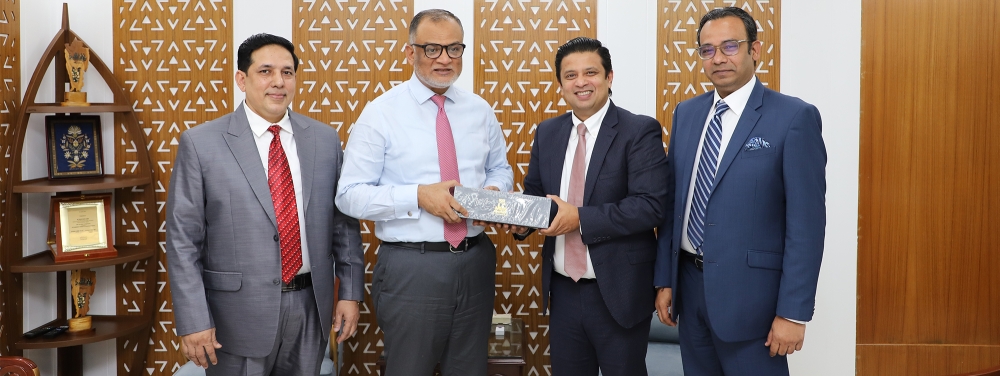News
DCCI President Taskeen Ahmed made a courtesy call on the Commerce Adviser

President of Dhaka Chamber of Commerce & Industry (DCCI) Taskeen Ahmed said there is no alternative to a radical reform and modernization of existing framework related to trade and investment, including import-export policy, revenue structure, financial management, logistic policy and national budget and monetary policy, to address the challenges of Bangladesh's post-LDC transition. Taskeen Ahmed made this comment during a meeting with the Commerce Adviser to the government Sk. Bashir Uddin at his secretariat office on January 19, 2025.
Mentioning that Bangladesh could not take adequate preparations for the post-LDC era challenges due to Covid pandemic, followed by the Russia-Ukraine war, unrest in the Middle Eastern region and later a political instability in the country in 2024, he suggested that the government may consider deferring the graduation process for a while to take all out preparations, because, once the country is graduated Bangladesh will lose a lot of preferential treatment in the international market. He also said that it is necessary to formulate a "smooth transition strategy" for proper implementation based on a series of public-private dialogue. Besides, government has to provide necessary support to the private sector to maintain the flow of business and investment by addressing all the challenges even after the LDC graduation.
Taskeen Ahmed also said the recent initiatives taken by the National Board of Revenue (NBR) to increase VAT, supplementary duty, excise duty and taxes on more than a hundred products have already caused concern among the mass people and businessmen of the country. If this move is implemented in the current economic situation of the country, it will put more pressure on the lives of the common people by increasing inflation, fueling cost of doing businesses and the move might hinder both local and foreign investment. Although the government has informed that it would reconsider the proposed tariff hike on several sectors, the DCCI president said that the move to increase VAT, tax in this current situation is not acceptable especially ahead of upcoming Ramadan. Taskeen Ahmed later, called for strengthening market monitoring activities to remove the existing irregularities in the supply chain management of products to control inflation in the market. He also said the Commerce Ministry should take strict measures to increase the supply of essential products, monitor the market and ensure the availability of essential goods in the market, especially during the month of Ramadan.
Commerce Adviser to the government Sk. Bashir Uddin said the student-mass uprising in July, its subsequent impact on the overall law and order situation, unexpected flood in different parts of the country, supply chain interruptions have disrupted business activities locally, but the overall situation has already been improving and the government is working relentlessly to further improve the situation. He hoped that the prices of essential commodities will remain stable in the upcoming month of holy Ramadan, but the recent rise in the price of rice has come to the attention of the government, however, the government is keeping its effort to keep this price at a tolerable level. He said to contain inflation and continue overall economic development activities in the country, it is very important to expand our tax collection as well as tax net. Mentioning that the private sector of the country will face many challenges after the LDC graduation, the Commerce Adviser said that for the overall betterment of the economy, reforms of relevant trade and investment related policies along with collective efforts of all stakeholders are indispensable.
He later stressed on the need of revisiting the “Smooth Transition Strategy” (STS) to make it more inclusive and workable. He said to attract local or foreign investment in the country, relevant policy support coupled with policy consistency is the most critical thing to be maintained. Adding to this, he said, if local investors do not feel the business environment friendly, in that case, why the foreign investors would show interest to invest here. However, the Commerce Adviser opined that there is no alternative to increasing the capacity of the private sector to meet the challenges of trade and investment in future.
Meanwhile, Senior Vice President of DCCI Razeev H. Chowdhury and Vice President Md. Salem Sulaiman were also present during the meeting.
Published on: 2025-01-20
